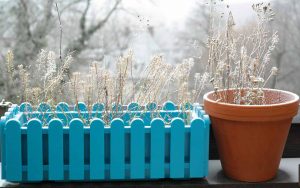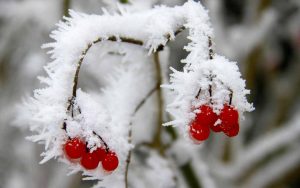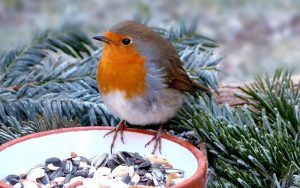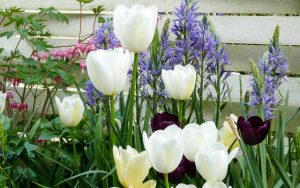Menu

As leaves do start to fall, it’s important to clear them from paths (which could get slippery), lawns (which will suffer from lack of light) and ponds (which will go sludgy). Some people will tell you to clear them from your beds and borders too but, actually, there are some benefits of leaves as a mulch and for wildlife, so we’ll leave that to your personal choice.
Those collected leaves could be next year’s leaf mould or compost, so think about reusing them in your own garden where you can. If you are planning a bonfire (if it’s permitted in your area), please check for hedgehogs and other wildlife sheltering before you light it!
If any of your leaves were from roses affected by black spot, don’t compost them as it risks carrying the disease into next year.

While your garden pots might be frost-proof, the soil and plants within them probably won’t be! Now is the time to raise any outdoor pots off the ground so they can drain well; pots full of water are more susceptible to freezing and therefore damaging plant roots than free-draining ones.
If you’re not sure if the pot itself is frost-proof, bubble wrap, layers of thin foam or hessian tied securely around it will offer some protection to both the pot and the plant. We have a range of beautiful outdoor pots which are frost-proof if you want to be sure.
(And while you’re outside with the bubblewrap, it’s also useful for insulating garden taps and greenhouses!)

There are a number of varieties of moth (collectively known as winter moth) whose caterpillars love to eat new buds as they emerge in the spring. They particularly favour fruit trees so can potentially devastate your crop. The lifecycle of these moths is such that adding a grease band to the trunk of your fruit trees now helps prevent the females crawling up the tree to lay their eggs in the first place. Horticultural grease bands or tree barrier glues are a pesticide-free way to help reduce this problem.
Winter wash is another pesticide-free solution, best suited to smaller trees. A vegetable oil-based liquid, applied to the branches between now and February, it will smother any eggs that have been laid. We have grease bands and winter wash in store.
For further information on pests and diseases in fruit trees, try the RHS website.

Although there are berries around at this time of year, garden birds appreciate any additional food we can offer them. As well as being lovely to see them, attracting birds to our gardens helps provide natural predators for other bugs, of course. Some species favour different types of food so why not check our range of Tom Chambers bird foods in store to see what is suitable for your regular visitors?
It’s important to offer fresh water to birds and other wildlife, as well as food. If it’s been cold overnight, always check that water sources haven’t frozen and top them up when required. (On really cold winter days, this might mean checking more than once a day!). And it’s important to keep any bird and wildlife feeders clean to prevent diseases; clean them out and scrub them regularly.

Now is the time to start planting tulips for a spectacular display next spring. They work brilliantly in pots (as tulips are not always reliable repeat flowerers, this makes it easy to dig them up if you want) but will look just as impressive in borders too. Plant them around 4 inches (10 cm) deep, making sure the bulbs have at least twice their height in depth of soil above them.
More November reading and tips:
What to plant in November – broad beans!
Get ahead with your Christmas shopping
Winter is a great time to tackle some bigger garden maintenance jobs
The benefits of ground cover planting
Think about the wildlife in your garden this coming winter
Hambrooks garden design, landscaping & garden maintenance throughout Hampshire for over 50 years.

